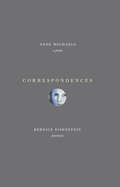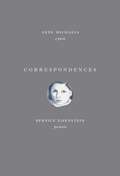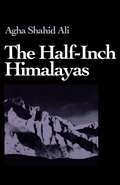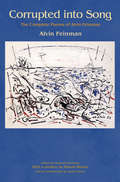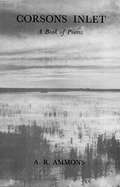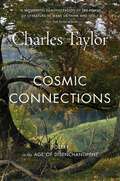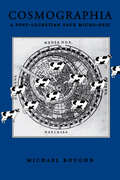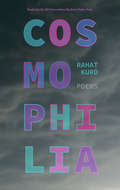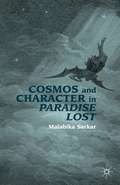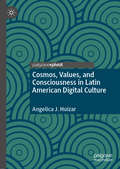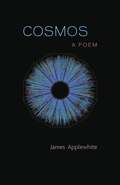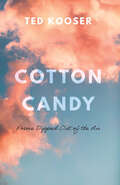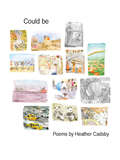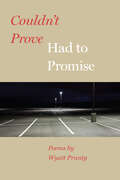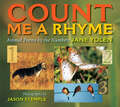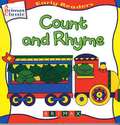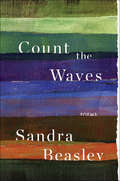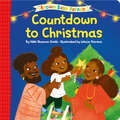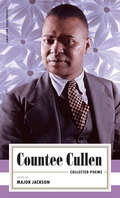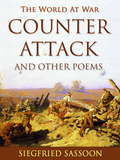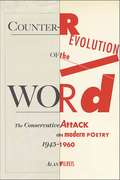- Table View
- List View
Correspondences
by Anne Michaels Bernice EisensteinA rare and beautifully produced "accordion" book by renowned novelist and poet Anne Michaels and acclaimed artist and writer Bernice Eisenstein that will cause a stir for both its form and its content.Anne Michaels's resonant book-length poem--which unfolds on one side of the pages of this accordion book--ranges from the universal to the intimate, as she writes of historical figures for whom language was the closest thing to salvation; on the other side, we have Bernice Eisenstein's luminous portraits of and quotes from such twentieth-century writers and thinkers as Paul Celan, Nelly Sachs, W. G. Sebald, Anna Akhmatova, Primo Levi, and Albert Einstein. The poetry and portraits join together in a dialogue that can be read in any direction and any order, in a format that perfectly reflects the thematic interconnectedness of this collaboration: "an alphabet of spirits and spirit; an elegy of remembrance" (Eisenstein); "just as a conversation becomes the third side of the page . . . the moment one life becomes another" (Michaels).
Correspondences: A poem and portraits
by Anne Michaels Bernice EisensteinThis beautifully conceived book brings together the best-selling novelist and poet Anne Michaels and the acclaimed artist and writer Bernice Eisenstein in a unique, accordion-style format. Michaels' resonant book-length poem, a historical and personal elegy, unfolds on one side of the book's pages. On the other side, in unison with the poem, are Bernice Eisenstein's haunting portraits of the twentieth-century writers and thinkers Michaels' poem summons, for whom language was the closest thing to salvation: figures such as Paul Celan, Nelly Sachs, W. G. Sebald, Anna Akhmatova, Primo Levi, and Albert Einstein, each accompanied by quotations that illuminate the deeper connections among them. The poem is written to be read in sequence, as well as to join together with the portraits in a dialogue that perfectly reflects the thematic interconnectedness of this collaboration: 'an alphabet of spirits and spirit' (Eisenstein); 'the moment one life/becomes another' (Michaels). A stunning creation in both form and content, Correspondences is an unforgettable visual and poetic experience and a profound reflection on how the table of history is set by individuals.
Corridor: Miniature Edition (Wesleyan New Poets)
by Jonathan AaronPoetry that springs from the collision of memory, dream, and history, Jonathan Aaron's narratives and lyrics develop in unpredictable, often unlikely ways toward moments of surprising disclosure. The poems in Corridor look back on actual or fictional events in history (the fate of a foolhardy Roman commander, the musings of a fourth-century farmer who saw the Huns), celebrate modern adventures of the imagination such as filmmaker Luis Bunuel and novelist/fabulist Julio Cortazar, explore moments of a private vision (a man recalls his addiction to cigarettes, a woman tries to communicate with a water monster), recast the narrative spells of a ballad - "Serial Nocturne," the collection's longest work, revisits and renews the age-old story of the demon lover. Different as they are, these poems are driven by an underlying impulse to portray characters as odds with the worlds they inhabit, people who are therefore all the more of those worlds, individuals whose dilemmas and crises all have something to tell us about the struggle of moral consciousness to discover itself.
Corrupted into Song: The Complete Poems of Alvin Feinman
by Harold Bloom James Geary Alvin Feinman Deborah DorfmanAccording to Harold Bloom, "The best of Alvin Feinman's poetry is as good as anything by a twentieth-century American. His work achieves the greatness of the American sublime." Yet, in part because he published so sparsely, Feinman remained little-read and largely unknown when he died in 2008. This definitive edition of Feinman's complete work, which includes fifty-seven previously published poems and thirty-nine unpublished poems discovered among his manuscripts, introduces a new generation of readers to the lyrical intensity and philosophical ambition of this major American poet. Harold Bloom, a lifelong friend of Feinman, provides a preface in which he examines Feinman's work in the context of the strongest poets of his generation--John Ashbery, James Merrill, and A. R. Ammons--while the introduction by James Geary, who studied with Feinman at Bennington College, presents a biographical and critical sketch of this remarkable poet and teacher. Corrupted into Song restores Feinman's work to its rightful place alongside that of poets like Hart Crane and Wallace Stevens, with whom his poetry and poetics have so much in common.
Corsons Inlet: A Book Of Poems
by A. R. AmmonsCorson's Inlet is A. R. Ammons's third book of poems. Consisting of some of his best early work, including such strikingly inventive poems as "Jungle Knot," "Coon Song," "Four Motions for the Pea Vines," and the title piece, this volume provides incontestable evidence of Ammons's rapid early growth as a poet, of his ever-broadening range and deepening perception. Corsons Inlet, like Ammons's Tape for the Turn of the Year, shows clearly his remarkable originality—and, more important, his lavish and unique poetic gifts.
Cosmic Connections: Poetry in the Age of Disenchantment
by Charles TaylorA major new work by Charles Taylor: the long-awaited follow-up to The Language Animal, exploring the Romantic poetics central to his theory of language.The Language Animal, Charles Taylor’s 2016 account of human linguistic capacity, was a revelation, toppling scholarly conventions and illuminating our most fundamental selves. But, as Taylor noted in that work, there was much more to be said. Cosmic Connections continues Taylor’s exploration of Romantic and post-Romantic responses to disenchantment and innovations in language.Reacting to the fall of cosmic orders that were at once metaphysical and moral, the Romantics used the symbols and music of poetry to recover contact with reality beyond fragmented existence. They sought to overcome disenchantment and groped toward a new meaning of life. Their accomplishments have been extended by post-Romantic generations into the present day. Taylor’s magisterial work takes us from Hölderlin, Novalis, Keats, and Shelley to Hopkins, Rilke, Baudelaire, and Mallarmé, and on to Eliot, Miłosz, and beyond.In seeking deeper understanding and a different orientation to life, the language of poetry is not merely a pleasurable presentation of doctrines already elaborated elsewhere. Rather, Taylor insists, poetry persuades us through the experience of connection. The resulting conviction is very different from that gained through the force of argument. By its very nature, poetry’s reasoning will often be incomplete, tentative, and enigmatic. But at the same time, its insight is too moving—too obviously true—to be ignored.
Cosmic Symphony
by Nikky-Guninder Kaur SinghThe early and latter poems of Bhai Vir Singh. A book released by Indian Rajya Sabha MP Tarlochan Singh.
Cosmographia: a Post-Lucretian Faux Micro Epic
by Michael BoughnButt out, Dante. Move over, Milton. Piss off, Pound. Outta the way, Olson. Here comes Cosmographia – a post-Lucretian faux micro-epic, the latest ground breaking incursion into the ever popular spectacle of the Epic Poem. Tracking the classic epic journey through the unfolding cosmos toward home, though occasionally disoriented by milling cows with similar intent, Cosmographia teems with nasty political invective, scurrilous spiritual slander, and endless exploitive sexual innuendo. Taking as its muses Cab Calloway and Charles Mingus, by the time it gets home, Cosmographia has subjected the epic to unspeakable acts in the name of linguistic rectumtude, dada terrorism, and sporadic ejaculations of self-expression. Oh yeah! – poetry will never be the same.
Cosmopolitan Greetings: Poems 1986-1992
by Allen GinsbergHalf a century after "founding" the Beat Generation, Allen Ginsberg has written this powerful collection of poems that are suffused with a range of emotional colors that gives Ginsberg's work an elegiac tone.
Cosmos And Character In Paradise Lost
by Malabika SarkarThis book offers a fresh contextual reading of Paradise Lost that suggests that a recovery of the vital intellectual ferment of the new science, magic, and alchemy of the seventeenth century reveals new and unexpected aspects of Milton's cosmos and chaos, and the characters of the angels and Adam and Eve. After examining the contextual references to cabalism, hermeticism, and science in the invocations and in the presentation of chaos and Night, the book focuses on the central stage of the epic action, Milton's unique cosmos, at once finite and infinite, with its re-orientation of compass points. While Milton relies on the new astronomy, optics and mechanics in configuring his cosmos, he draws upon alchemy to suggest that the imagined prelapsarian cosmos is the crucible within which vital re-orientations of authority could have taken place.
Cosmos, Values, and Consciousness in Latin American Digital Culture
by Angelica J. HuizarThis book understands digital cultural production of electronic literatures and digital art by looking at electronic and digital works that produce subjective positionality, clouded knowledges of quantum theories, and metaphysical patterns grounded in a cultural ideology. This book underlines a conceptual framework for understanding how digital media impacts reading, approaching, and even interpreting social reality. The qualitative analyses interpret the current zeitgeist, and the works selected speak of the diverse, sometimes regionalized, and often multi-ethnic reality of the Latin American experience. The analyses elaborate on how artists reflect both the world they live in and a universal consciousness. These artists are not simply “digitalizing literature,” and these works are more than techy creations; rather, they make us think of other directions and connections.
Cosmos: A Poem
by James ApplewhiteThroughout his long career, James Applewhite has skillfully navigated the world of science through poetry. His new book makes no exception, fearlessly exploring time and consciousness in relation to the universe as described by Big Bang cosmology -- and as experienced by human beings in the everyday world. Applying experiences from his present-day life as well as a multitude of memories from his childhood to scientific theories of the nature of the universe, the poet engages in a patient but relentless -- and finally deeply rewarding -- quest for a sense of meaning in a cosmos whose dimensions of space and time defy the human capacity to imagine. In his quest, Applewhite suggests the continuing possibility of a crucial connection to the universe through our seemingly tiny, evanescent experiences here on planet Earth. The poems in Cosmos help us value the human-related dimensions of being all the more as they are discerned against the cosmic vastness."We've known for a long time gravitydoesn't exist," Dr. Verlinde said.This adhesion of all mass to itself isfollowing the vector of energy downwardwith the thermodynamic arrow, which pierces uswith our moments. The illusion encloses,scenes in mind return nonsensically -- my foot slips on the slick bank and fora moment suspended in fallingI know the time slow down, seeingthe red-star sweet gum leafsliding with the current's surfacethat holds the late September skyand heat in a thin film.Then I pierce it, splashing through -- the rowboat my brother called the Peanut Shellrocking out from the bank whileI arise back through the brown creekskin and into air of the dream worldI know so well, where Henry is laughing. -- from "Reading the Science News"
Cotidianas
by Mario BenedettiMARIO BENEDETTI nació en 1920 en Paso de los Toros, República Oriental del Uruguay. Entre 1938 y 1941 residió en Buenos Aires. En 1945 integró la redacción del semanario uruguayo Marcha. En 1949 publicó Esta mañana, su primer libro de cuentos, y un año más tarde, los poemas de Sólo mientras tanto. En 1953 apareció su primera novela, Quién de nosotros, pero fue con el volumen de cuentos Montevideanos, publicado en 1959, que tomó forma la concepción urbana de su obra narrativa. Con La tregua, que apareció en 1960, Benedetti adquirió trascendencia internacional. La novela tuvo más de cien ediciones y fue traducida a diecinueve idiomas. En 1973 debió abandonar su país por razones políticas y residió en la Argentina, Perú, Cuba y España. En 1987 recibió el Premio Llama de Oro de Amnistía Internacional por su novela Primavera con una esquina rota, en 1999 el Premio Reina Sofía de Poesía Iberoamericana y en 2005 el Premio Internacional Menéndez y Pelayo. También obtuvo cuatro Doctorados Honoris Causa otorgados por las universidades de Alicante, de Valladolid, de La Habana y de la República de Montevideo. Sus libros más recientes son La borra de café (1992), Perplejidades de fin de siglo (1993), El olvido está lleno de memoria (1994), El amor, las mujeres y la vida (1995), Andamios (1996), La vida ese paréntesis (1998), Buzón de tiempo (1999), Rincón de Haikus (1999), El mundo que respiro (2001), Insomnios y duermevelas (2002), El porvenir de mi pasado (2003), Defensa propia (2004) y Adioses y bienvenidas (2005). Su obra poética ha sido recogida en Inventario Uno (1950-1985), Inventario Dos (1986-1991) e Inventario tres (1991-2001) y sus cuentos en Cuentos completos (1994).
Cotton Candy: Poems Dipped Out of the Air
by Ted Kooser&“Poems dipped out of the air&” describes the manner in which Ted Kooser composed the poems in Cotton Candy, the result of his daily routine of getting up long before dawn, sitting with coffee, pen, and notebook, and writing whatever drifts into his mind. Whether those words and images are serious or just plain silly, Kooser tries not to censor himself. His objective is to catch whatever comes to him, to snatch it out of the air in words, rhythms, and cadences, the way a cotton candy vendor dips an airy puff out of a cloud of spun sugar and hands it to his customer. Poems written in fun and now shared with the reader, Kooser&’s playful and magical confections charm and delight.
Could Be
by Heather CadsbyPoems about the unexpected and often wry coincidences language lends to life. In Could be, each poem is a moment of engaged and isolated attention, prodding language, relationships, the mundane aspects of daily life, friendships and art. It asks how we use words, how we shape them and are in turn shaped by them. In many ways, then, this book is about how we construct our world through language, and how language unexpectedly shifts the terms on us. It is wry, funny, moving and at times disturbing. It will quietly assert itself, as so often language itself does, and will challenge readers to reconsider how they engage with words and world.
Couldn't Prove, Had to Promise (Johns Hopkins: Poetry and Fiction)
by Wyatt PruntyIn his ninth collection of poems, Wyatt Prunty explores the comic and lyric intersection of the realms of childhood and middle age.In Couldn't Prove, Had to Promise, Wyatt Prunty ushers readers into a seesaw world, one that teeters between small fables of childish misgivings and adult assurances. Alternately shadowed and illuminated by nostalgia, this deft, witty volume brings together seventeen of Prunty's recent poems, seven of which have been previously published in Poetry, the Hopkins Review, the Kenyon Review, and Blackbird.In "Crescent Theater, Schenectady, NY," a silent-movie accompanist reads his foreign newspaper after work as he listens, ever the outsider, "to his children using English / For everything they wish." In "Rules," a small girl, told she can't go to the school nurse "every time some bad thing happens," plaintively wonders, "Where do you go?" And in "Making Frankenstein," a boy who has cajoled his parents into letting him see The Curse of Frankenstein wakes to a nightmare. His father bans horror films as "too anatomical"; "What's anatomical?" the boy wonders. Given a book that catalogs diseases, the worst of which come "from intimate contact," he is horrified by his father's explanation of grownup intimacy: "That's how you made your way into this world."Moving from a wry portrait of a husband—musing on mortality—whose Christmas tie lands in the gravy, to "Reading the Map," which grapples with the cartography of love, to "ad lib," a farewell that redefines farewell, these poems burnish the small triumphs and fears that fill our daily lives with humor and pathos. The book closes with a long, four-part poem, "Nod," which transports readers to a parking lot in July: an asphalt-as-inferno where Cain the cracker, or adversary-as-initiator, the pleuritic voice of disappointment, names the ways inversion makes a lie reliable and works people best as, like a joke or discount price, "It makes you feel you're getting more by giving less." Funny, raw, and colorfully musical, "Nod" plays what teeters, like a tuning fork.
Count Me a Rhyme: Animal Poems by the Numbers
by Jane YolenThis delightful counting book of poetry and pictures on the Texas 2x2 Reading List captures animals by the numbers. Vivid, playful poems tell the stories of one elk, two birds, three fish—from one through ten and then many—as they go about their day either solo or within a special circle of friends. The marvelous photographs allows readers to peek at some common creatures that enjoy the company of others.
Count and Rhyme
by Jenny TulipThis is a counting book for the very young. Simple rhymes feature ten frogs, who play with familiar toys to show toddlers the numbers from one through ten. " Six little frogs play bat and ball. One jumps up and sits on the wall."
Count the Waves: Poems
by Sandra BeasleyIn this intense, illuminating collection of poems, Sandra Beasley examines how intimacy is lost and gained during our travels. In Count the Waves, Sandra Beasley turns her eclectic imagination to the heart's pursuits. A man and a woman sit at the same dinner table, an ocean of worry separating them. An iceberg sets out to dance. A sword swallower ponders his dating prospects. "The vessel is simple, a rowboat among yachts," the poet observes in "Ukulele." "No one hides a Tommy gun in its case. / No bluesman runs over his uke in a whiskey rage." Beasley's voice is pithy and playful, with a ferocious intelligence that invites comparison to both Sylvia Plath and Dorothy Parker. In one of six signature sestinas, she warns, "You must not use a house to build a home, / and never look for poetry in poems." The collection's centerpiece is a haunting sequence that engages The Traveler's Vade Mecum, an 1853 compendium of phrases for use by mail, telegraph, or the enigmatic "Instantaneous Letter Writer." Assembled over ten years and thousands of miles, these poems illuminate how intimacy is lost and gained during our travels. Decisive, funny, and as compassionate as she is merciless, Beasley is a reckoning force on the page.
Countdown to Christmas (Brown Baby Parade)
by Nikki Shannon SmithIt's almost Christmas! Count down the days with festive activities in this next installment in the Brown Baby Parade series.It&’s 10 days &‘til Christmas!We set up our tree—ornaments, twinkling lights,pretty as can be.It&’s 10 days &’til Christmas! A little girl and her family prepare by putting up the tree, wrapping presents, baking delicious treats, and much more. Read along as they count down to Christmas Day!Nikki Shannon Smith's soothing, rhythmic text and Letícia Moreno's warm, welcoming illustrations pair beautifully to create heartwarming scenes of Black and brown babies in everyday life. The many seasonal activities will allow kids to relate no matter how their families celebrate!
Countee Cullen: Collected Poems
by Major Jackson Countee CullenA major and sometimes controversial figure of the Harlem Renaissance, Countee Cullen fused a mastery of the formal lyric with a passionate engagement with themes social, religious, racial, and personal in such books as Color, Copper Sun, and The Black Christ. Certain of his poems--"Heritage," "Yet Do I Marvel"--are widely celebrated, but much of Cullen's work remains to be discovered. This volume restores to print a body of work of singular intensity and beauty.This is volume #32 in The Library of America's American Poets Project series.
Counter-Attack and Other Poems (The World At War)
by Siegfried SassoonSiegfried Loraine Sassoon, CBE, MC (8 September 1886 – 1 September 1967) was an English poet, writer, and soldier. Decorated for bravery on the Western Front,[1] he became one of the leading poets of the First World War. This collection of poems was first published in May 1918. (Excerpt from Wikipedia)
Counter-revolution of the Word
by Alan FilreisDuring the Cold War an unlikely coalition of poets, editors, and politicians converged in an attempt to discredit--if not destroy--the American modernist avant-garde. Ideologically diverse yet willing to bespeak their hatred of modern poetry through the rhetoric of anticommunism, these "anticommunist antimodernists," as Alan Filreis dubs them, joined associations such as the League for Sanity in Poetry to decry the modernist "conspiracy" against form and language. In Counter-revolution of the Word Filreis narrates the story of this movement and assesses its effect on American poetry and poetics.Although the antimodernists expressed their disapproval through ideological language, their hatred of experimental poetry was ultimately not political but aesthetic, Filreis argues. By analyzing correspondence, decoding pseudonyms, drawing new connections through the archives, and conducting interviews, Filreis shows that an informal network of antimodernists was effective in suppressing or distorting the postwar careers of many poets whose work had appeared regularly in the 1930s. Insofar as modernism had consorted with radicalism in the Red Decade, antimodernists in the 1950s worked to sever those connections, fantasized a formal and unpolitical pre-Depression High Modern moment, and assiduously sought to de-radicalize the remnant avant-garde. Filreis's analysis provides new insight into why experimental poetry has aroused such fear and alarm among American conservatives.
